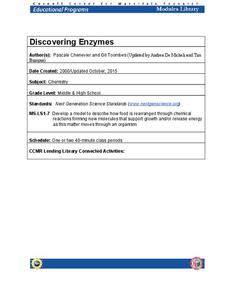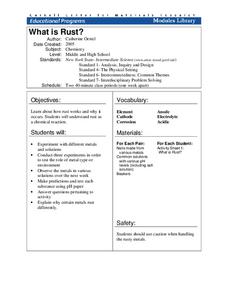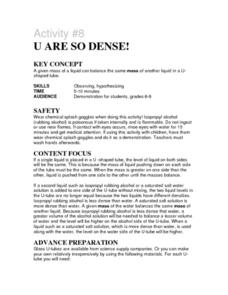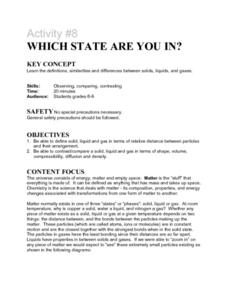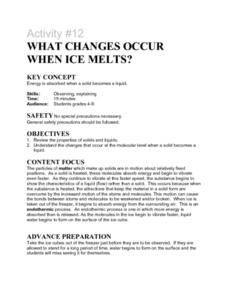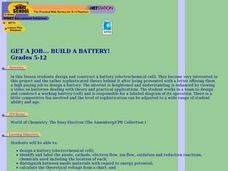American Museum of Natural History
What do you Know About Climate Change?
Test the class's knowledge of the key components of climate change. A 10-question online quiz asks learners about weather, climate, greenhouse gases, and several other concepts related to climate change. Interactive and easy for...
Cornell University
Discovering Enzymes
Explore the function of enzymes through a series of lab investigations. Learners use household enzymes such as hydrogen peroxide to model the role of enzymes. The enzymes break down proteins with and without a catalyst.
Cornell University
What Is Rust?
Why do metals rust differently? Scholars experiment with metal combinations in a hands-on activity. They create unique environments with different metals and compare the rate and amount of rust for each.
Royal Society of Chemistry
A Solid-Solid Reaction between Lead Nitrate and Potassium Iodide
Why is it so difficult to make two solid compounds react? Investigate the concepts of particle collisions and rate of reaction using a quick demonstration. The colorful experiment features two plain, white solids combining to form a...
Curated OER
Activity #8 U Are So Dense!
Young scholars watch as the teacher demonstrates: if a single liquid is placed in a U-shaped tube, the level of liquid on both sides are the same. When the mass is greater on one side than the other, liquid is pushed from one side to...
Curated OER
Determining Liquid Densities
Students practice determining liquid densities in a short, hands-on lab activity. Students use a graduated cylinder to measure out 100 milliliters of a liquid, find its mass using a balance, and record measurements in a data table....
Curated OER
Activity #8 Which State Are You In?
Students define, give similarites and differences between solids, liquids, and gases. They compare and contrast a solid, liquid and gas in terms of shape, volume, compressibility, diffusion and density. Pupils classigy common...
Curated OER
What Changes Occur When Ice Melts?
Young scholars explore the physical process of melting. They observe melting ice and answer questions related to energy transfer during phase changes.
Curated OER
Activity #20 Tear An Aluminum Can In Half
Students observe the chemical reaction between CuCl2 and aluminum. They identify the evidence for a chemical change. Pupils answer the following questions after observing the experiment: How do you know a chemical reaction occurred?,...
Curated OER
Freshwater Macroinvertebrates
Students identify and count Macroinvertebrates at a Hydrology website. In this macroinvertebrates lesson students collect, sort and identify Macroinvertebrates.
Curated OER
Metric Units of Capacity - Problem Solving 12.8
In this units of capacity instructional activity, students read the word problems and solve the problems finding the metric units of capacity for each. In the 'use data' problem, students use the recipe to help them solve the problem.
Curated OER
Ice Cream
Open this instructional activity by giving a brief history of ice cream. Using liquid nitrogen to lower the temperature, preteens make their own confection. The accompanying activity sheet queries learners about freezing point, the...
Exploratorium
Bubble Tray
Create jumbo bubbles and use them to teach about surface tension or interference, perfect for a physical science lesson on light or molecular attraction.
Curated OER
Space Shuttle
One slide details the features of Space Shuttle Discovery in graphic form. Another shows a faulty hydrogen fuel sensor. The final slide is a picture of the explosion of Space Shuttle Challenger and the ill-fated crew. If you wanted to...
Curated OER
Chemical Change vs. Physical Change
In this physical and chemical change worksheet, learners are given a description of these changes. They are given ten changes that the students identify as chemical or physical changes based on their reading.
Curated OER
The Basics of Biochemistry
Science teachers can introduce basic chemical concepts to biology students.
Curated OER
Capillary Action and Adhesion
Students perform classroom experiments to observe adhesion. They perform a second experiment using sand, salt, water, and a heat lamp to observe the principle of capillary action. They also experiment with adhesion in plants.
Curated OER
Esters: The Secret of Natural and Synthetic Fragrances
Students investigate esters, make an ester and detect esters in natural foods and plants. In this esters lesson plan, students detect smells of hidden objects, produce an ester using peas, brown sugar and apple and demonstrate how to...
Curated OER
Get a Job.....Build a Battery!
Students design and construct a battery (electrochemical cell). They works in a team to design and construct a working battery and is responsible for a labeled diagram of its operation. This engaging lesson stimulate their creative juices!
Curated OER
The Recycling Factory
In this density of materials worksheet, students examine ways to sort a dump truck of recycled materials using the density of the material types. Students write a letter to the city council to describe their method of sorting.
Curated OER
Fun Activities Using Seeds
Students analyze the size, shape, and form of several different seeds. In this all about seeds lesson plan, students complete four activities involving characteristics of seeds. Students observe the seeds, record information about the...
Curated OER
Inter-State Matters
Students explore the six phase transitions between gases, liquids and solids for a variety of elements. Each group of students focuses on a different element, investigating its physical properties during each of the six phase transitions.
Curated OER
Magma Flow
Learners explore the flow of magma. They observe the effect of silica and heat on lava flow through a model using everyday items. in addition, they complete analysis questions.
Curated OER
Not So Neutral Views
Students explore ways to use indicators to distinguish between acids and bases. They conduct an experiment to model and discuss the harmful effect of acid rain in our living and non-living environment.
Other popular searches
- Lake Water Chemistry
- Water Chemistry Ions
- Co2 Water Chemistry
- Water Chemistry Lesson Plans
- Ocean Water Chemistry
- Basic Water Chemistry
- Water Chemistry Properties
- Storm Water Chemistry
- Marine Water Chemistry
- Size vs. Water Chemistry
- Chemistry of Water
- Water Chemistry Nitrate

